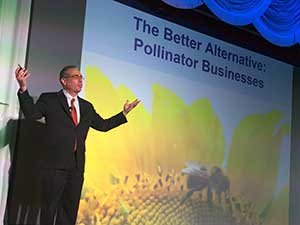 In communities across the country, economic developers are charged with attracting and retaining business in their corner of the world. But according to Michael Shuman – economist, attorney, author, and entrepreneur, you can’t attract local businesses because they’re already there. That means economic developers are focused on attracting global businesses, using tax abatements and other incentives which carry a high cost for the community but often don’t produce a correspondingly high return on investment.
In communities across the country, economic developers are charged with attracting and retaining business in their corner of the world. But according to Michael Shuman – economist, attorney, author, and entrepreneur, you can’t attract local businesses because they’re already there. That means economic developers are focused on attracting global businesses, using tax abatements and other incentives which carry a high cost for the community but often don’t produce a correspondingly high return on investment.
Shuman suggests an alternative approach – focus on developing and supporting local entrepreneurs. Research shows that locally-owned businesses are extremely beneficial to the communities in which they operate, generating 2 1/2 times more jobs and 2-4 times more economic development activity from every dollar that goes into them. Local businesses also contribute to tourism through the uniqueness of their enterprises; improve public health via access to local, healthy food; and increase political participation through higher voting rates.
Shuman offered four rules for cultivating local prosperity:
- Maximize local ownership
- Maximize local self-reliance
- Spread models of Triple Bottom Line Success
- Create an entrepreneurial ecosystem
Shuman says the benefit of local businesses can be amplified through a mechanism he refers to as business pollinators – self-financing enterprises committed to boosting local businesses by undertaking one or more of five key economic development functions – business planning, local purchasing, entrepreneurship, business partnerships, and local investment. He cited several examples of businesses pollinators currently at work that could be deployed in Michigan communities.
One well-known business pollinator is Zingerman’s Deli in Ann Arbor.The owners made a conscious decision not to become a chain, but rather build new businesses right in their hometown. They have not built 10 independently-owned businesses, ranging from a bake house and coffee roasting company to a sit-down restaurant and a mail order cake company. Those businesses have created over 650 jobs and sales of over $50 million a year – and it didn’t cost the city a dime. They’re the result of a smart business owner thinking like an economic developer should think.
Another interesting example of a business pollinator is Main Street Genome in Washington, D.C. They can be very helpful to local businesses in the area of purchasing by gathering information from them and feeding it back to them in a way that helps them be more efficient. In one instance, they analyzed invoices from a number of restaurants and realized that a certain supplier was selling cauliflower to some of them for $1 and to others for $5. Armed with that data, they negotiated with the supplier and were able to reduce the restaurants’ expenses by 15 percent. Main Street doesn’t charge for their service, but rather splits the profit with the companies it assists.
That’s the beauty of the pollinator approach, says Shuman. Rather than nurture businesses one or two at a time, you create the infrastructure for nurturing hundreds or thousands of businesses at a time. Why can’t it be done in Michigan or our community? And why not now?
Michael Shuman outlines many more business pollinator models in his books, which are available on his website (click here):
- Local Dollars, Local Sense: How to Shift Your Money from Wall Street to Main Street and Achieve Real Prosperity
- The Small-Mart Revolution: How Local Businesses Are Beating the Global Competition
- Going Local: Creating Self-Reliant Communities in a Global Age
- Growing Local Living Economies: A Grassroots Approach to Economic Development
To download Michael Shuman’s Convention presentation, click here.

